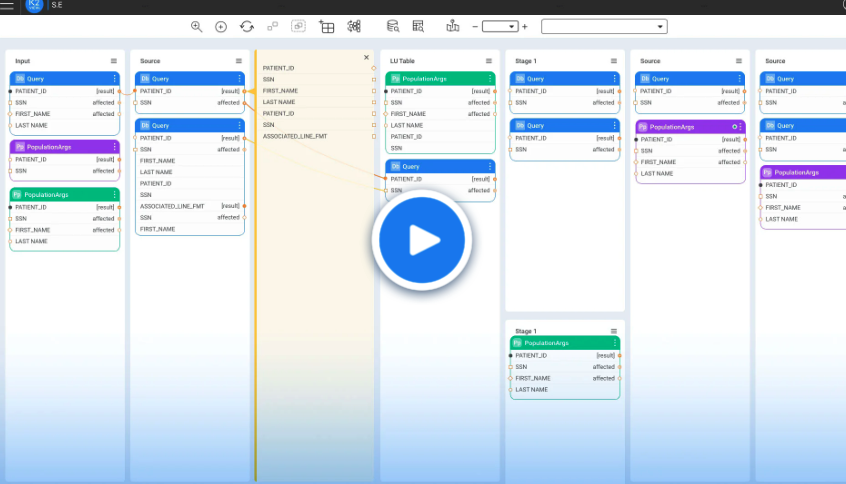Table of contents
With so many data masking vendors out there, finding the most appropriate one can be challenging. Here are this year's top picks and ways to evaluate them.
Top data masking vendors for 2025
Here are the 5 leading data masking vendors in the industry:
1. K2view
![]()
K2view data masking is a standalone product that features auto-discovery of PII and PHI, structured and unstructured data masking, referential integrity retention, any-source data extraction, 100s of masking functions, and on-demand synthetic data generation.
K2view data masking technology is based on a patented, business entity approach that automatically discovers and masks all the Personally Identifiable Information (PII) and other sensitive data associated with a specific business entity (e.g., a customer), and makes it accessible to authorized data consumers according to role-based access controls.
Supporting both static and dynamic data masking, K2view leverages the business entity data model as a blueprint for generating accurate and compliant synthetic data, using AI/ML and configurable business rules.
-Dec-26-2024-01-43-38-3744-PM.png?width=1950&height=924&name=image%20(5)-Dec-26-2024-01-43-38-3744-PM.png)
2. Broadcom
![]()
Broadcom offers data masking as part of its Test Data Manager solution. The Test Data Manager combines elements of data subsetting, masking and on-demand data generation, to help testing teams meet their organization’s data testing needs. According to user reviews, Broadcom’s interface is complex, and does not enable a self-service approach.
3. IBM
The IBM InfoSphere Optim Data Privacy solution allows users to apply a variety of techniques to replace sensitive data with contextually accurate and realistic (yet fictional) data. The solution helps organizations easily identify where sensitive data exists, and mask it on-demand, within databases, warehouses, in the cloud, and big data environments. It enables data masking in both production and non-production environments. According to user reviews, the IBM solution is missing certain crucial integrations.
4. Informatica
Informatica Persistent Data Masking, scheduled for retirement in 2024/25, secures sensitive data via anonymization and encryption to support use in analytics, test, development, and non-production environments. It provides scalability, management, and connectivity for traditional databases, Apache Hadoop, and cloud environments – while ensuring consistent data masking policies across the enterprise with a single audit trail. According to user reviews, Informatica has a steep learning curve, which slows down time-to-value. In addition, critical concerns surrounding Informatica Cloud Test Data Management have been raised, especially in light of the retirement of its on-prem version.
5. Dataprof
Datprof Privacy is designed to mask data consistently across multiple tables, systems, or cloud applications. Combined with synthetic data generation capabilities, Dataprof Privacy helps organizations attain scalable and representative test data sets while preserving continuity and keeping sensitive information secure. According to user reviews, the Dataprof solution requires a lot of effort to prepare template implementations, and doesn’t allow for dataset reusability.
How to evaluate data masking vendors
Data masking is fundamental to effective data governance. It’s considered a must for complying with GDPR, CCPA, and other data privacy regulations. Not to mention, it enables continuous and efficient software development, while minimizing the risk of a breach.
However, with a growing market of data masking vendors, it can be difficult to accurately evaluate your options and select the right one for your organization.
In this article, beyond the aforementioned list of the top 5 data masking vendors for 2025, we’ll provide a clear overview of data masking, why it’s important, what features to look for in a data masking tool.
Definitions and drivers of data masking
Data masking is a process of data obfuscation and data anonymization. It involves replacing real PII (Personally Identifiable Information) with scrambled, yet statistically equivalent, data. Although masked data can’t be identified or reverse-engineered, it’s still functional for production use cases, such as test data management and Customer 360.
Here’s why data masking has become a must-have capability for enterprises today:
- Expansion and maturation of privacy laws
Complying with increasingly strict data privacy laws is a top business driver for data masking. Failing to comply with laws such as PCI/DSS, HIPAA, GDPR, CPRA/CCPA, and LGPD can cost companies millions of dollars (4% of their annual turnover). On top of that, businesses found to be non-compliant are subject to steep litigation fees, as well as reputational damage. - Rising insider threats
Today, 60% of data breaches are the result of insider threats. Programmers, software testers and other users with access to insufficiently protected production environments all pose potential threats. Enterprises are highly motivated to remediate this threat, as the average annual cost per incident is up more than a third since 2020, to $15.38 million. - Better enablement of ML/AI projects
Protecting sensitive data is often the biggest obstacle to ML/AI implementations, for which AI and ML engineers require troves of real-world data. On top of the proliferation of ML/AI projects, their migration to the cloud increases the risk of a breach. Data masking resolves both data protection and data migration. - Increase of remote work
Today, company workforces are more dispersed than ever. As a result, enterprises often need to comply with a broad range of local data privacy policies. At the same time, ensuring safe access to internal networks is more challenging.
Data masking tool requirements
When you begin evaluating data masking vendors, make sure to look for the following features and capabilities:
-
PII discovery
You can’t mask what can’t find. Make sure your chosen vendor can automatically discover any data and metadata, catalog and map schema relationships, and identify PII. -
Multiple data masking techniques
Developers, data scientists, and software testers have different data masking requests, depending on the task at hand. Make sure the data masking vendor you select can support a broad range of data masking techniques, such as anonymization, pseudonymization (e.g., tokenization), encrypted lookup substitution, redaction, shuffling, data aging, and nulling out. -
Unstructured data masking
Sensitive data is often found within unstructured, or qualitative, data, such as images, PDFs, drivers licenses, XML documents, chats, and more. Unless your data masking vendor can mask unstructured, as well as structured, data, compliance will be difficult to enforce. -
Dynamic data masking
Dynamic data masking allows data teams to specify the type and extent of sensitive data non-authorized users can access. Data masking tools that enable a dynamic approach minimize the risk of a data breach and noncompliance, while providing developers and testers the access to the data they need. -
Relational Consistency
Masked data must be represented consistently, and persistently, throughout your business systems. To achieve this, every type of data originating from a certain business system must be masked with the same algorithm. The data masking vendor you select should be able to automatically apply the same types of data masking techniques and algorithms to the PII in the various data sources. -
Reporting and auditing functionality
Data masking tools that come with built-in reporting and auditing capabilities support enterprises in their quest for data protection and compliance. Core reporting capabilities include:
– Recording all masking activities and instances
– Visualizing data dependencies and relationships
– Documenting applied masking techniques for internal or external data governance audits.
Better data masking with business entities
There are a lot of boxes to check when evaluating data masking vendors. Among the top 5, only 1 has entity-based data masking technology: K2view.
A business entity approach achieves the highest data masking standard. It enables data masking best practices, resulting in more robust and flexible capabilities, and more test data management benefits, than any other solution. And it ensures all types of data masking, providing relational consistency and security, and protecting data at rest, in use, and in transit.
With entity-based data masking, enterprises can make sure production, testing, and analytical teams have the ability to use the data they need, without exposing the organization to the risk of a security event or non-compliance – all thanks to business entities.
Learn why K2view data masking tools
are ranked numero uno in 2025.














